Organisational Behaviour Report: TESCO's Motivational Strategies
VerifiedAdded on 2023/01/04
|17
|5762
|490
Report
AI Summary
This report delves into the realm of organisational behaviour, examining how culture, politics, and power dynamics influence individual and team performance within an organisational context, specifically using TESCO as a case study. The report explores the impact of organisational culture, including task, power, role, and person cultures, and analyses the role of politics and power structures within the company. Furthermore, it evaluates motivational strategies, including Maslow's hierarchy of needs, to enhance employee engagement and achieve organisational goals. The report also differentiates between effective and ineffective teams, outlining key characteristics. The analysis provides insights into the application of organisational behaviour principles, offering practical recommendations for improving team performance, employee motivation, and overall organisational effectiveness. The report emphasizes the importance of understanding human behaviour to achieve organisational objectives.
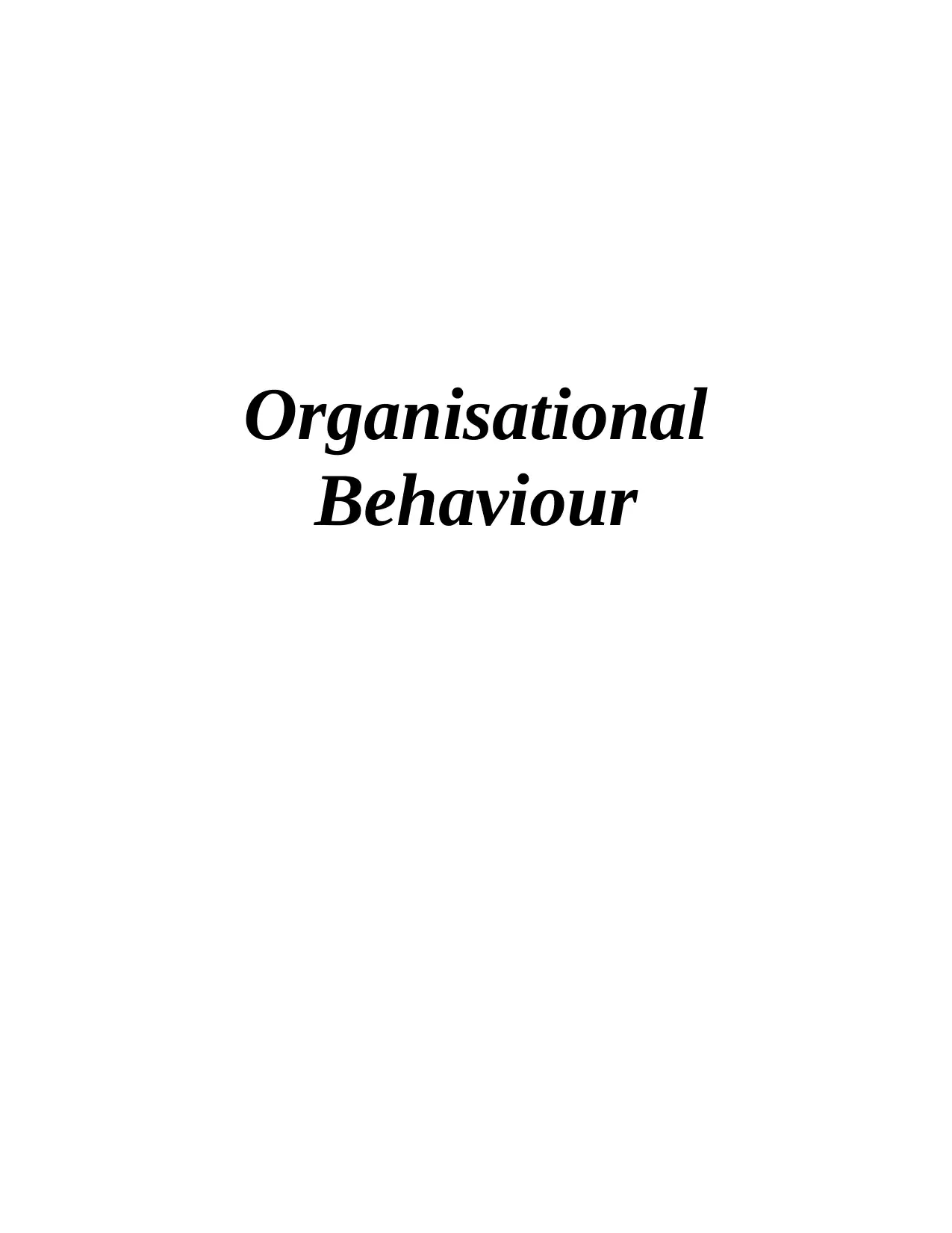
Organisational
Behaviour
Behaviour
Paraphrase This Document
Need a fresh take? Get an instant paraphrase of this document with our AI Paraphraser
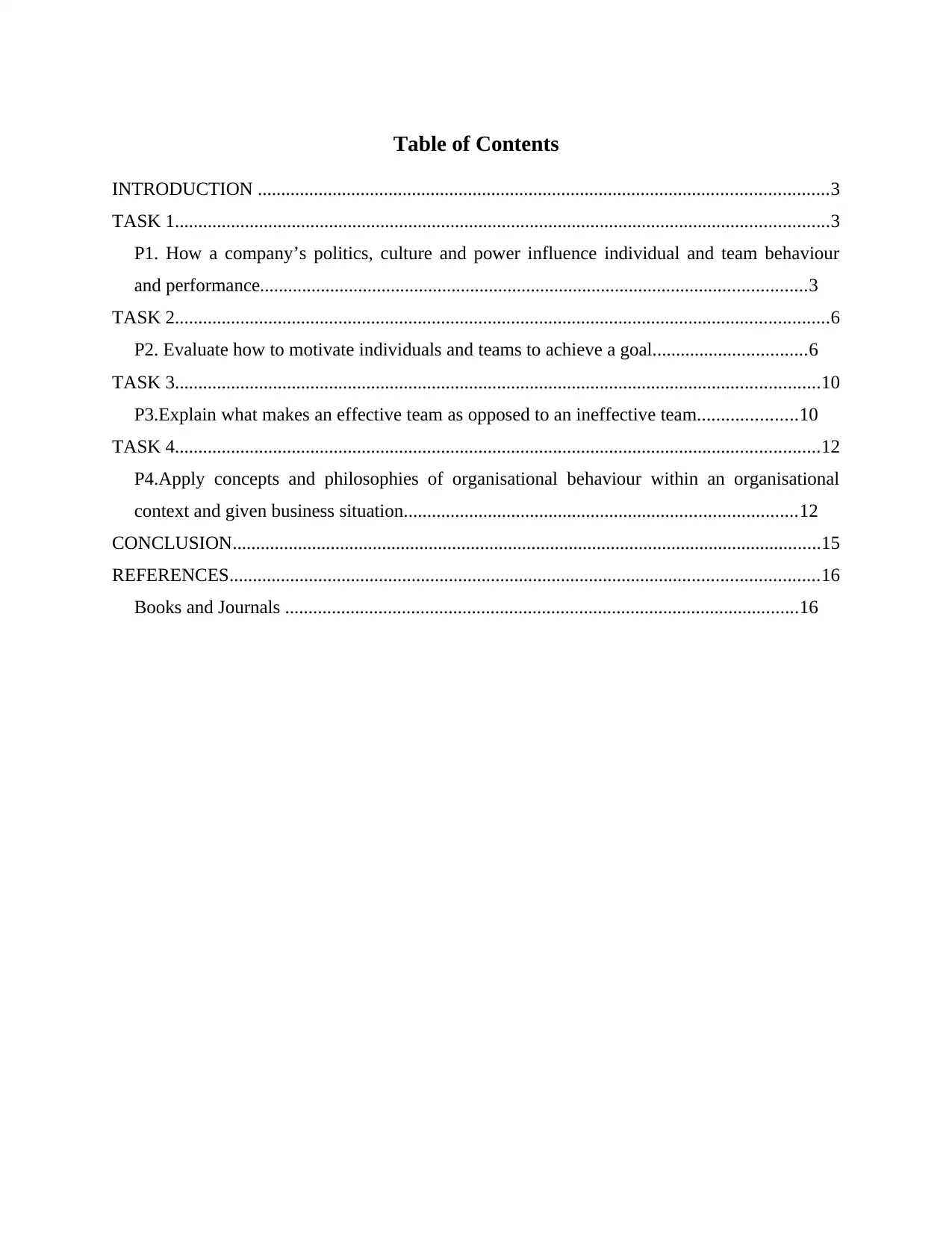
Table of Contents
INTRODUCTION ..........................................................................................................................3
TASK 1............................................................................................................................................3
P1. How a company’s politics, culture and power influence individual and team behaviour
and performance.....................................................................................................................3
TASK 2............................................................................................................................................6
P2. Evaluate how to motivate individuals and teams to achieve a goal.................................6
TASK 3..........................................................................................................................................10
P3.Explain what makes an effective team as opposed to an ineffective team.....................10
TASK 4..........................................................................................................................................12
P4.Apply concepts and philosophies of organisational behaviour within an organisational
context and given business situation....................................................................................12
CONCLUSION..............................................................................................................................15
REFERENCES..............................................................................................................................16
Books and Journals ..............................................................................................................16
INTRODUCTION ..........................................................................................................................3
TASK 1............................................................................................................................................3
P1. How a company’s politics, culture and power influence individual and team behaviour
and performance.....................................................................................................................3
TASK 2............................................................................................................................................6
P2. Evaluate how to motivate individuals and teams to achieve a goal.................................6
TASK 3..........................................................................................................................................10
P3.Explain what makes an effective team as opposed to an ineffective team.....................10
TASK 4..........................................................................................................................................12
P4.Apply concepts and philosophies of organisational behaviour within an organisational
context and given business situation....................................................................................12
CONCLUSION..............................................................................................................................15
REFERENCES..............................................................................................................................16
Books and Journals ..............................................................................................................16
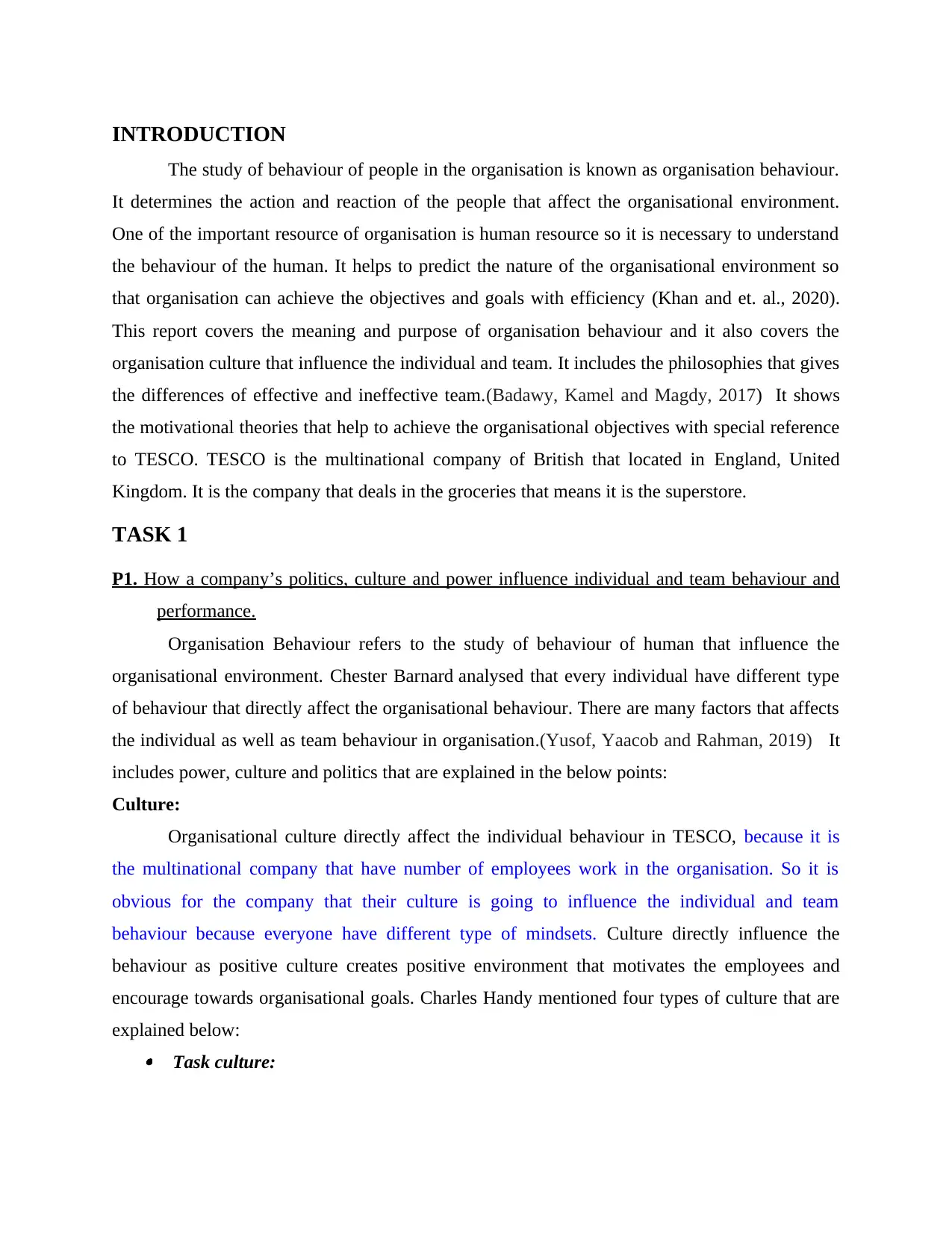
INTRODUCTION
The study of behaviour of people in the organisation is known as organisation behaviour.
It determines the action and reaction of the people that affect the organisational environment.
One of the important resource of organisation is human resource so it is necessary to understand
the behaviour of the human. It helps to predict the nature of the organisational environment so
that organisation can achieve the objectives and goals with efficiency (Khan and et. al., 2020).
This report covers the meaning and purpose of organisation behaviour and it also covers the
organisation culture that influence the individual and team. It includes the philosophies that gives
the differences of effective and ineffective team.(Badawy, Kamel and Magdy, 2017) It shows
the motivational theories that help to achieve the organisational objectives with special reference
to TESCO. TESCO is the multinational company of British that located in England, United
Kingdom. It is the company that deals in the groceries that means it is the superstore.
TASK 1
P1. How a company’s politics, culture and power influence individual and team behaviour and
performance.
Organisation Behaviour refers to the study of behaviour of human that influence the
organisational environment. Chester Barnard analysed that every individual have different type
of behaviour that directly affect the organisational behaviour. There are many factors that affects
the individual as well as team behaviour in organisation.(Yusof, Yaacob and Rahman, 2019) It
includes power, culture and politics that are explained in the below points:
Culture:
Organisational culture directly affect the individual behaviour in TESCO, because it is
the multinational company that have number of employees work in the organisation. So it is
obvious for the company that their culture is going to influence the individual and team
behaviour because everyone have different type of mindsets. Culture directly influence the
behaviour as positive culture creates positive environment that motivates the employees and
encourage towards organisational goals. Charles Handy mentioned four types of culture that are
explained below: Task culture:
The study of behaviour of people in the organisation is known as organisation behaviour.
It determines the action and reaction of the people that affect the organisational environment.
One of the important resource of organisation is human resource so it is necessary to understand
the behaviour of the human. It helps to predict the nature of the organisational environment so
that organisation can achieve the objectives and goals with efficiency (Khan and et. al., 2020).
This report covers the meaning and purpose of organisation behaviour and it also covers the
organisation culture that influence the individual and team. It includes the philosophies that gives
the differences of effective and ineffective team.(Badawy, Kamel and Magdy, 2017) It shows
the motivational theories that help to achieve the organisational objectives with special reference
to TESCO. TESCO is the multinational company of British that located in England, United
Kingdom. It is the company that deals in the groceries that means it is the superstore.
TASK 1
P1. How a company’s politics, culture and power influence individual and team behaviour and
performance.
Organisation Behaviour refers to the study of behaviour of human that influence the
organisational environment. Chester Barnard analysed that every individual have different type
of behaviour that directly affect the organisational behaviour. There are many factors that affects
the individual as well as team behaviour in organisation.(Yusof, Yaacob and Rahman, 2019) It
includes power, culture and politics that are explained in the below points:
Culture:
Organisational culture directly affect the individual behaviour in TESCO, because it is
the multinational company that have number of employees work in the organisation. So it is
obvious for the company that their culture is going to influence the individual and team
behaviour because everyone have different type of mindsets. Culture directly influence the
behaviour as positive culture creates positive environment that motivates the employees and
encourage towards organisational goals. Charles Handy mentioned four types of culture that are
explained below: Task culture:
⊘ This is a preview!⊘
Do you want full access?
Subscribe today to unlock all pages.

Trusted by 1+ million students worldwide
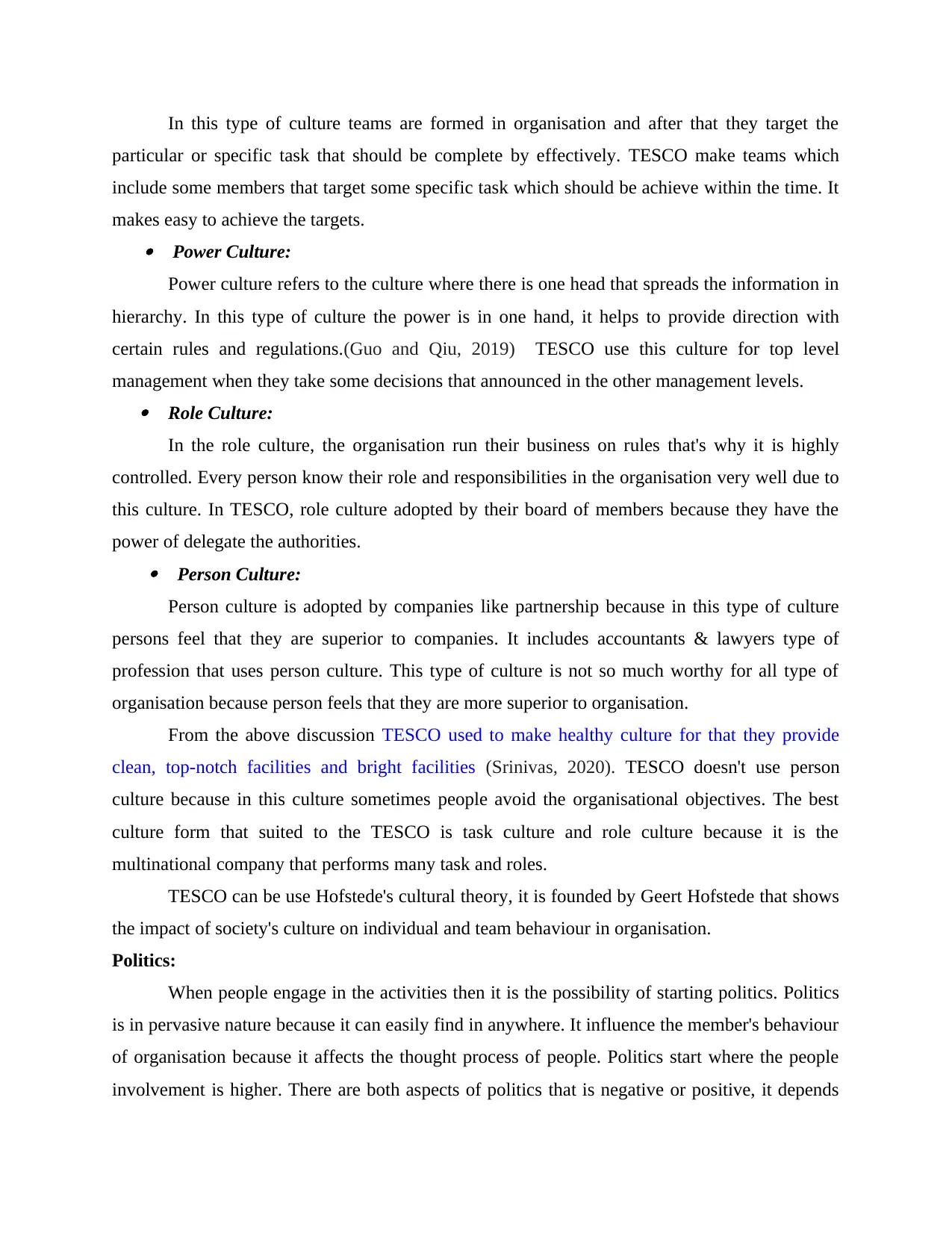
In this type of culture teams are formed in organisation and after that they target the
particular or specific task that should be complete by effectively. TESCO make teams which
include some members that target some specific task which should be achieve within the time. It
makes easy to achieve the targets. Power Culture:
Power culture refers to the culture where there is one head that spreads the information in
hierarchy. In this type of culture the power is in one hand, it helps to provide direction with
certain rules and regulations.(Guo and Qiu, 2019) TESCO use this culture for top level
management when they take some decisions that announced in the other management levels. Role Culture:
In the role culture, the organisation run their business on rules that's why it is highly
controlled. Every person know their role and responsibilities in the organisation very well due to
this culture. In TESCO, role culture adopted by their board of members because they have the
power of delegate the authorities. Person Culture:
Person culture is adopted by companies like partnership because in this type of culture
persons feel that they are superior to companies. It includes accountants & lawyers type of
profession that uses person culture. This type of culture is not so much worthy for all type of
organisation because person feels that they are more superior to organisation.
From the above discussion TESCO used to make healthy culture for that they provide
clean, top-notch facilities and bright facilities (Srinivas, 2020). TESCO doesn't use person
culture because in this culture sometimes people avoid the organisational objectives. The best
culture form that suited to the TESCO is task culture and role culture because it is the
multinational company that performs many task and roles.
TESCO can be use Hofstede's cultural theory, it is founded by Geert Hofstede that shows
the impact of society's culture on individual and team behaviour in organisation.
Politics:
When people engage in the activities then it is the possibility of starting politics. Politics
is in pervasive nature because it can easily find in anywhere. It influence the member's behaviour
of organisation because it affects the thought process of people. Politics start where the people
involvement is higher. There are both aspects of politics that is negative or positive, it depends
particular or specific task that should be complete by effectively. TESCO make teams which
include some members that target some specific task which should be achieve within the time. It
makes easy to achieve the targets. Power Culture:
Power culture refers to the culture where there is one head that spreads the information in
hierarchy. In this type of culture the power is in one hand, it helps to provide direction with
certain rules and regulations.(Guo and Qiu, 2019) TESCO use this culture for top level
management when they take some decisions that announced in the other management levels. Role Culture:
In the role culture, the organisation run their business on rules that's why it is highly
controlled. Every person know their role and responsibilities in the organisation very well due to
this culture. In TESCO, role culture adopted by their board of members because they have the
power of delegate the authorities. Person Culture:
Person culture is adopted by companies like partnership because in this type of culture
persons feel that they are superior to companies. It includes accountants & lawyers type of
profession that uses person culture. This type of culture is not so much worthy for all type of
organisation because person feels that they are more superior to organisation.
From the above discussion TESCO used to make healthy culture for that they provide
clean, top-notch facilities and bright facilities (Srinivas, 2020). TESCO doesn't use person
culture because in this culture sometimes people avoid the organisational objectives. The best
culture form that suited to the TESCO is task culture and role culture because it is the
multinational company that performs many task and roles.
TESCO can be use Hofstede's cultural theory, it is founded by Geert Hofstede that shows
the impact of society's culture on individual and team behaviour in organisation.
Politics:
When people engage in the activities then it is the possibility of starting politics. Politics
is in pervasive nature because it can easily find in anywhere. It influence the member's behaviour
of organisation because it affects the thought process of people. Politics start where the people
involvement is higher. There are both aspects of politics that is negative or positive, it depends
Paraphrase This Document
Need a fresh take? Get an instant paraphrase of this document with our AI Paraphraser
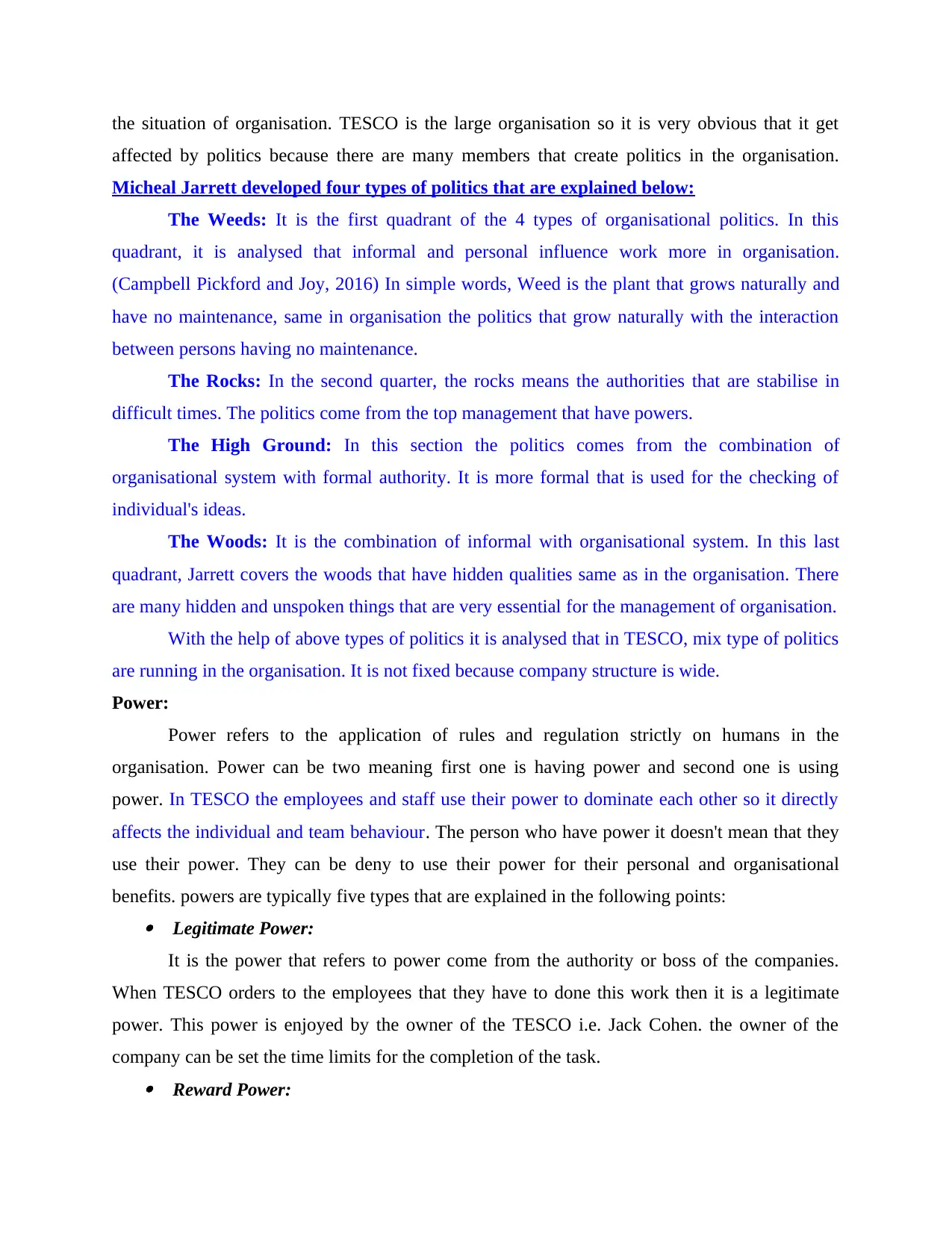
the situation of organisation. TESCO is the large organisation so it is very obvious that it get
affected by politics because there are many members that create politics in the organisation.
Micheal Jarrett developed four types of politics that are explained below:
The Weeds: It is the first quadrant of the 4 types of organisational politics. In this
quadrant, it is analysed that informal and personal influence work more in organisation.
(Campbell Pickford and Joy, 2016) In simple words, Weed is the plant that grows naturally and
have no maintenance, same in organisation the politics that grow naturally with the interaction
between persons having no maintenance.
The Rocks: In the second quarter, the rocks means the authorities that are stabilise in
difficult times. The politics come from the top management that have powers.
The High Ground: In this section the politics comes from the combination of
organisational system with formal authority. It is more formal that is used for the checking of
individual's ideas.
The Woods: It is the combination of informal with organisational system. In this last
quadrant, Jarrett covers the woods that have hidden qualities same as in the organisation. There
are many hidden and unspoken things that are very essential for the management of organisation.
With the help of above types of politics it is analysed that in TESCO, mix type of politics
are running in the organisation. It is not fixed because company structure is wide.
Power:
Power refers to the application of rules and regulation strictly on humans in the
organisation. Power can be two meaning first one is having power and second one is using
power. In TESCO the employees and staff use their power to dominate each other so it directly
affects the individual and team behaviour. The person who have power it doesn't mean that they
use their power. They can be deny to use their power for their personal and organisational
benefits. powers are typically five types that are explained in the following points: Legitimate Power:
It is the power that refers to power come from the authority or boss of the companies.
When TESCO orders to the employees that they have to done this work then it is a legitimate
power. This power is enjoyed by the owner of the TESCO i.e. Jack Cohen. the owner of the
company can be set the time limits for the completion of the task. Reward Power:
affected by politics because there are many members that create politics in the organisation.
Micheal Jarrett developed four types of politics that are explained below:
The Weeds: It is the first quadrant of the 4 types of organisational politics. In this
quadrant, it is analysed that informal and personal influence work more in organisation.
(Campbell Pickford and Joy, 2016) In simple words, Weed is the plant that grows naturally and
have no maintenance, same in organisation the politics that grow naturally with the interaction
between persons having no maintenance.
The Rocks: In the second quarter, the rocks means the authorities that are stabilise in
difficult times. The politics come from the top management that have powers.
The High Ground: In this section the politics comes from the combination of
organisational system with formal authority. It is more formal that is used for the checking of
individual's ideas.
The Woods: It is the combination of informal with organisational system. In this last
quadrant, Jarrett covers the woods that have hidden qualities same as in the organisation. There
are many hidden and unspoken things that are very essential for the management of organisation.
With the help of above types of politics it is analysed that in TESCO, mix type of politics
are running in the organisation. It is not fixed because company structure is wide.
Power:
Power refers to the application of rules and regulation strictly on humans in the
organisation. Power can be two meaning first one is having power and second one is using
power. In TESCO the employees and staff use their power to dominate each other so it directly
affects the individual and team behaviour. The person who have power it doesn't mean that they
use their power. They can be deny to use their power for their personal and organisational
benefits. powers are typically five types that are explained in the following points: Legitimate Power:
It is the power that refers to power come from the authority or boss of the companies.
When TESCO orders to the employees that they have to done this work then it is a legitimate
power. This power is enjoyed by the owner of the TESCO i.e. Jack Cohen. the owner of the
company can be set the time limits for the completion of the task. Reward Power:
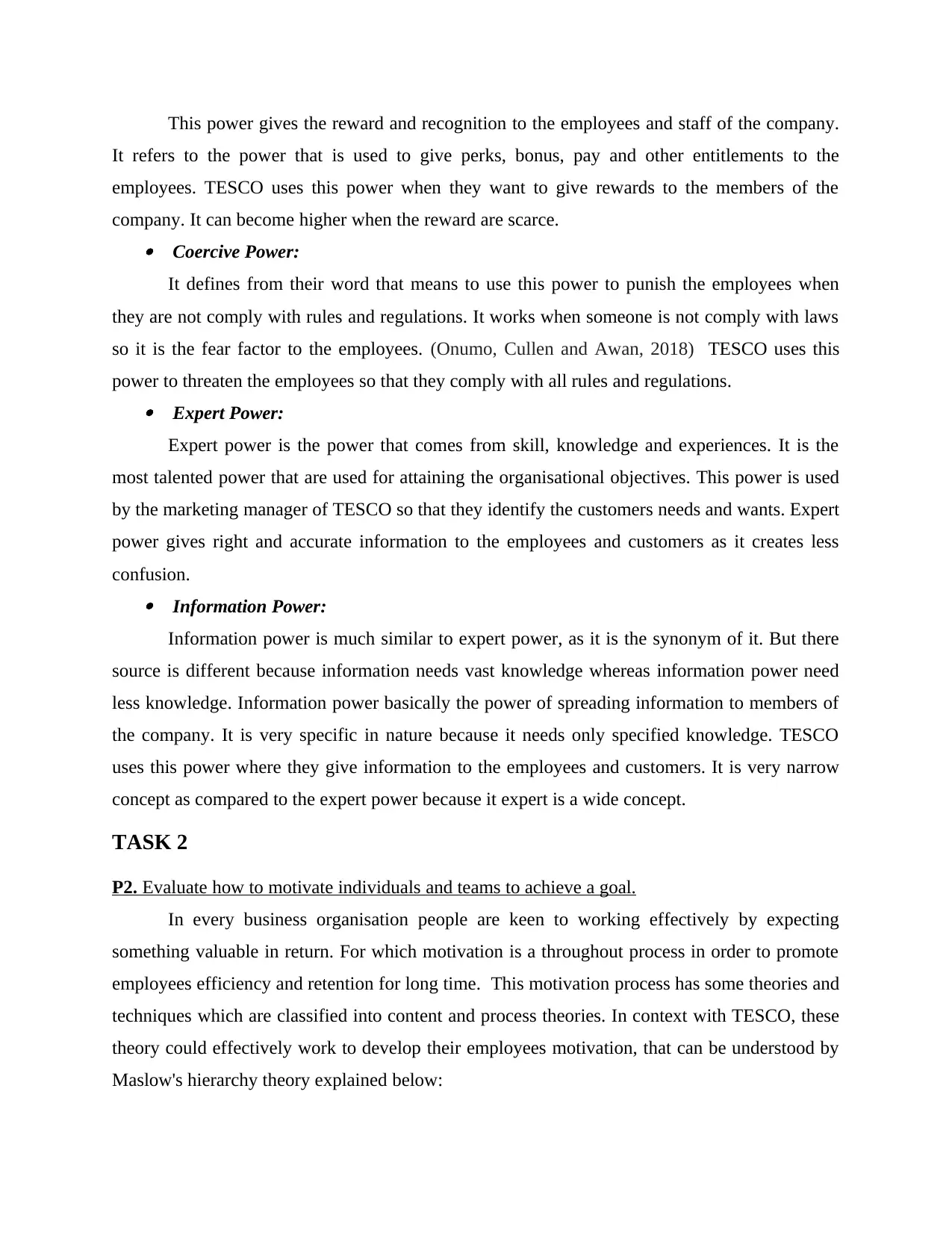
This power gives the reward and recognition to the employees and staff of the company.
It refers to the power that is used to give perks, bonus, pay and other entitlements to the
employees. TESCO uses this power when they want to give rewards to the members of the
company. It can become higher when the reward are scarce. Coercive Power:
It defines from their word that means to use this power to punish the employees when
they are not comply with rules and regulations. It works when someone is not comply with laws
so it is the fear factor to the employees. (Onumo, Cullen and Awan, 2018) TESCO uses this
power to threaten the employees so that they comply with all rules and regulations. Expert Power:
Expert power is the power that comes from skill, knowledge and experiences. It is the
most talented power that are used for attaining the organisational objectives. This power is used
by the marketing manager of TESCO so that they identify the customers needs and wants. Expert
power gives right and accurate information to the employees and customers as it creates less
confusion. Information Power:
Information power is much similar to expert power, as it is the synonym of it. But there
source is different because information needs vast knowledge whereas information power need
less knowledge. Information power basically the power of spreading information to members of
the company. It is very specific in nature because it needs only specified knowledge. TESCO
uses this power where they give information to the employees and customers. It is very narrow
concept as compared to the expert power because it expert is a wide concept.
TASK 2
P2. Evaluate how to motivate individuals and teams to achieve a goal.
In every business organisation people are keen to working effectively by expecting
something valuable in return. For which motivation is a throughout process in order to promote
employees efficiency and retention for long time. This motivation process has some theories and
techniques which are classified into content and process theories. In context with TESCO, these
theory could effectively work to develop their employees motivation, that can be understood by
Maslow's hierarchy theory explained below:
It refers to the power that is used to give perks, bonus, pay and other entitlements to the
employees. TESCO uses this power when they want to give rewards to the members of the
company. It can become higher when the reward are scarce. Coercive Power:
It defines from their word that means to use this power to punish the employees when
they are not comply with rules and regulations. It works when someone is not comply with laws
so it is the fear factor to the employees. (Onumo, Cullen and Awan, 2018) TESCO uses this
power to threaten the employees so that they comply with all rules and regulations. Expert Power:
Expert power is the power that comes from skill, knowledge and experiences. It is the
most talented power that are used for attaining the organisational objectives. This power is used
by the marketing manager of TESCO so that they identify the customers needs and wants. Expert
power gives right and accurate information to the employees and customers as it creates less
confusion. Information Power:
Information power is much similar to expert power, as it is the synonym of it. But there
source is different because information needs vast knowledge whereas information power need
less knowledge. Information power basically the power of spreading information to members of
the company. It is very specific in nature because it needs only specified knowledge. TESCO
uses this power where they give information to the employees and customers. It is very narrow
concept as compared to the expert power because it expert is a wide concept.
TASK 2
P2. Evaluate how to motivate individuals and teams to achieve a goal.
In every business organisation people are keen to working effectively by expecting
something valuable in return. For which motivation is a throughout process in order to promote
employees efficiency and retention for long time. This motivation process has some theories and
techniques which are classified into content and process theories. In context with TESCO, these
theory could effectively work to develop their employees motivation, that can be understood by
Maslow's hierarchy theory explained below:
⊘ This is a preview!⊘
Do you want full access?
Subscribe today to unlock all pages.

Trusted by 1+ million students worldwide
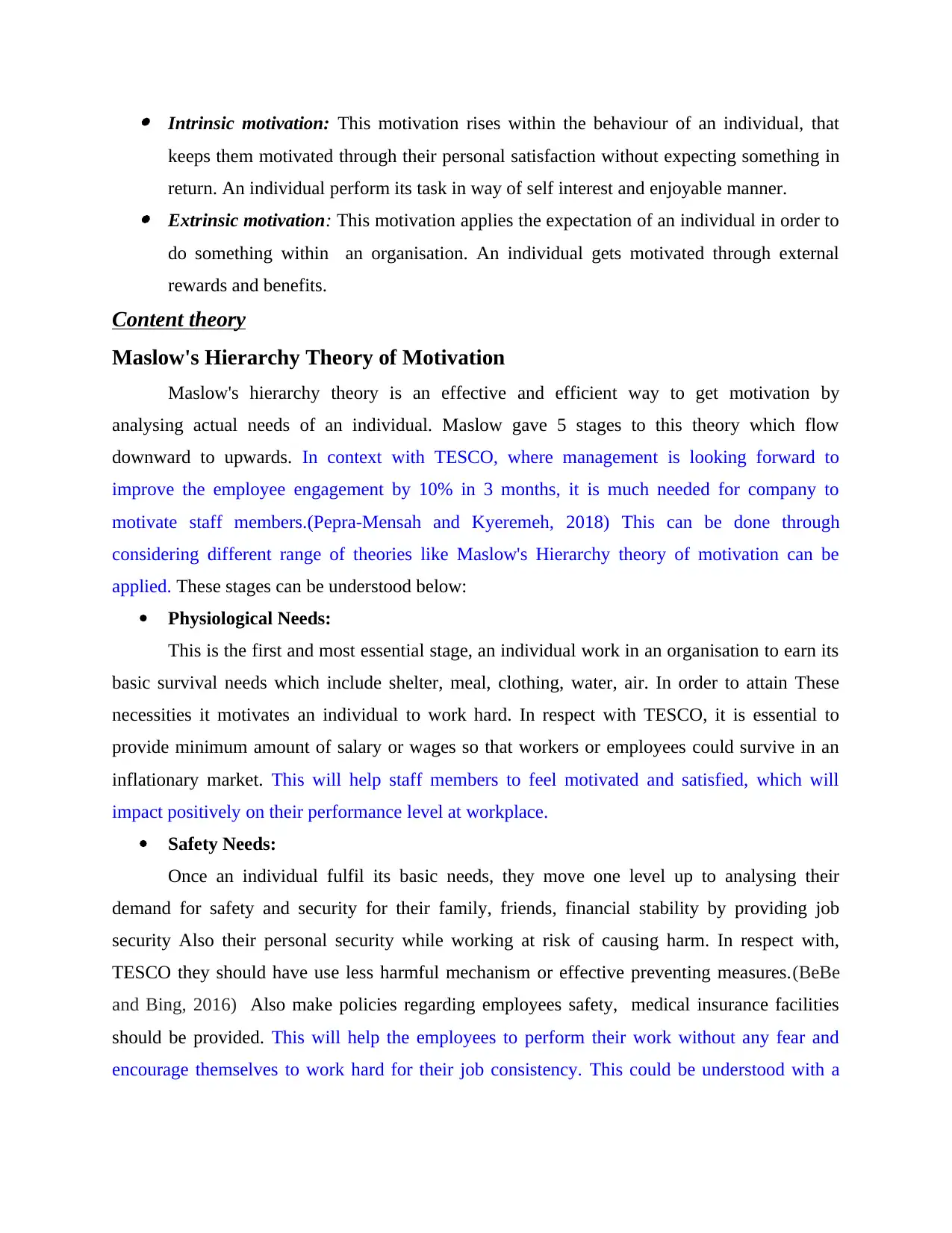
Intrinsic motivation: This motivation rises within the behaviour of an individual, that
keeps them motivated through their personal satisfaction without expecting something in
return. An individual perform its task in way of self interest and enjoyable manner. Extrinsic motivation: This motivation applies the expectation of an individual in order to
do something within an organisation. An individual gets motivated through external
rewards and benefits.
Content theory
Maslow's Hierarchy Theory of Motivation
Maslow's hierarchy theory is an effective and efficient way to get motivation by
analysing actual needs of an individual. Maslow gave 5 stages to this theory which flow
downward to upwards. In context with TESCO, where management is looking forward to
improve the employee engagement by 10% in 3 months, it is much needed for company to
motivate staff members.(Pepra-Mensah and Kyeremeh, 2018) This can be done through
considering different range of theories like Maslow's Hierarchy theory of motivation can be
applied. These stages can be understood below:
Physiological Needs:
This is the first and most essential stage, an individual work in an organisation to earn its
basic survival needs which include shelter, meal, clothing, water, air. In order to attain These
necessities it motivates an individual to work hard. In respect with TESCO, it is essential to
provide minimum amount of salary or wages so that workers or employees could survive in an
inflationary market. This will help staff members to feel motivated and satisfied, which will
impact positively on their performance level at workplace.
Safety Needs:
Once an individual fulfil its basic needs, they move one level up to analysing their
demand for safety and security for their family, friends, financial stability by providing job
security Also their personal security while working at risk of causing harm. In respect with,
TESCO they should have use less harmful mechanism or effective preventing measures.(BeBe
and Bing, 2016) Also make policies regarding employees safety, medical insurance facilities
should be provided. This will help the employees to perform their work without any fear and
encourage themselves to work hard for their job consistency. This could be understood with a
keeps them motivated through their personal satisfaction without expecting something in
return. An individual perform its task in way of self interest and enjoyable manner. Extrinsic motivation: This motivation applies the expectation of an individual in order to
do something within an organisation. An individual gets motivated through external
rewards and benefits.
Content theory
Maslow's Hierarchy Theory of Motivation
Maslow's hierarchy theory is an effective and efficient way to get motivation by
analysing actual needs of an individual. Maslow gave 5 stages to this theory which flow
downward to upwards. In context with TESCO, where management is looking forward to
improve the employee engagement by 10% in 3 months, it is much needed for company to
motivate staff members.(Pepra-Mensah and Kyeremeh, 2018) This can be done through
considering different range of theories like Maslow's Hierarchy theory of motivation can be
applied. These stages can be understood below:
Physiological Needs:
This is the first and most essential stage, an individual work in an organisation to earn its
basic survival needs which include shelter, meal, clothing, water, air. In order to attain These
necessities it motivates an individual to work hard. In respect with TESCO, it is essential to
provide minimum amount of salary or wages so that workers or employees could survive in an
inflationary market. This will help staff members to feel motivated and satisfied, which will
impact positively on their performance level at workplace.
Safety Needs:
Once an individual fulfil its basic needs, they move one level up to analysing their
demand for safety and security for their family, friends, financial stability by providing job
security Also their personal security while working at risk of causing harm. In respect with,
TESCO they should have use less harmful mechanism or effective preventing measures.(BeBe
and Bing, 2016) Also make policies regarding employees safety, medical insurance facilities
should be provided. This will help the employees to perform their work without any fear and
encourage themselves to work hard for their job consistency. This could be understood with a
Paraphrase This Document
Need a fresh take? Get an instant paraphrase of this document with our AI Paraphraser
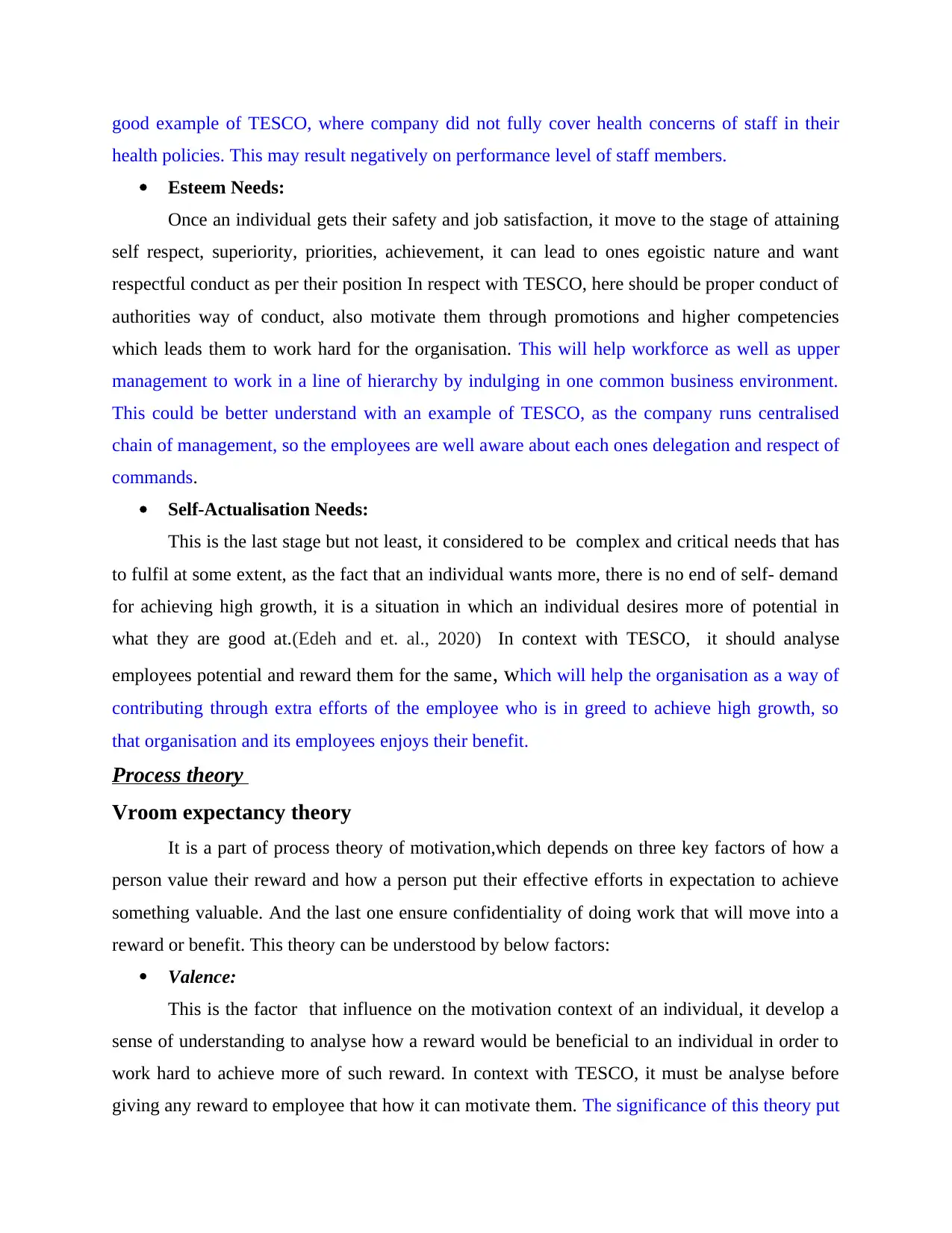
good example of TESCO, where company did not fully cover health concerns of staff in their
health policies. This may result negatively on performance level of staff members.
Esteem Needs:
Once an individual gets their safety and job satisfaction, it move to the stage of attaining
self respect, superiority, priorities, achievement, it can lead to ones egoistic nature and want
respectful conduct as per their position In respect with TESCO, here should be proper conduct of
authorities way of conduct, also motivate them through promotions and higher competencies
which leads them to work hard for the organisation. This will help workforce as well as upper
management to work in a line of hierarchy by indulging in one common business environment.
This could be better understand with an example of TESCO, as the company runs centralised
chain of management, so the employees are well aware about each ones delegation and respect of
commands.
Self-Actualisation Needs:
This is the last stage but not least, it considered to be complex and critical needs that has
to fulfil at some extent, as the fact that an individual wants more, there is no end of self- demand
for achieving high growth, it is a situation in which an individual desires more of potential in
what they are good at.(Edeh and et. al., 2020) In context with TESCO, it should analyse
employees potential and reward them for the same, which will help the organisation as a way of
contributing through extra efforts of the employee who is in greed to achieve high growth, so
that organisation and its employees enjoys their benefit.
Process theory
Vroom expectancy theory
It is a part of process theory of motivation,which depends on three key factors of how a
person value their reward and how a person put their effective efforts in expectation to achieve
something valuable. And the last one ensure confidentiality of doing work that will move into a
reward or benefit. This theory can be understood by below factors:
Valence:
This is the factor that influence on the motivation context of an individual, it develop a
sense of understanding to analyse how a reward would be beneficial to an individual in order to
work hard to achieve more of such reward. In context with TESCO, it must be analyse before
giving any reward to employee that how it can motivate them. The significance of this theory put
health policies. This may result negatively on performance level of staff members.
Esteem Needs:
Once an individual gets their safety and job satisfaction, it move to the stage of attaining
self respect, superiority, priorities, achievement, it can lead to ones egoistic nature and want
respectful conduct as per their position In respect with TESCO, here should be proper conduct of
authorities way of conduct, also motivate them through promotions and higher competencies
which leads them to work hard for the organisation. This will help workforce as well as upper
management to work in a line of hierarchy by indulging in one common business environment.
This could be better understand with an example of TESCO, as the company runs centralised
chain of management, so the employees are well aware about each ones delegation and respect of
commands.
Self-Actualisation Needs:
This is the last stage but not least, it considered to be complex and critical needs that has
to fulfil at some extent, as the fact that an individual wants more, there is no end of self- demand
for achieving high growth, it is a situation in which an individual desires more of potential in
what they are good at.(Edeh and et. al., 2020) In context with TESCO, it should analyse
employees potential and reward them for the same, which will help the organisation as a way of
contributing through extra efforts of the employee who is in greed to achieve high growth, so
that organisation and its employees enjoys their benefit.
Process theory
Vroom expectancy theory
It is a part of process theory of motivation,which depends on three key factors of how a
person value their reward and how a person put their effective efforts in expectation to achieve
something valuable. And the last one ensure confidentiality of doing work that will move into a
reward or benefit. This theory can be understood by below factors:
Valence:
This is the factor that influence on the motivation context of an individual, it develop a
sense of understanding to analyse how a reward would be beneficial to an individual in order to
work hard to achieve more of such reward. In context with TESCO, it must be analyse before
giving any reward to employee that how it can motivate them. The significance of this theory put
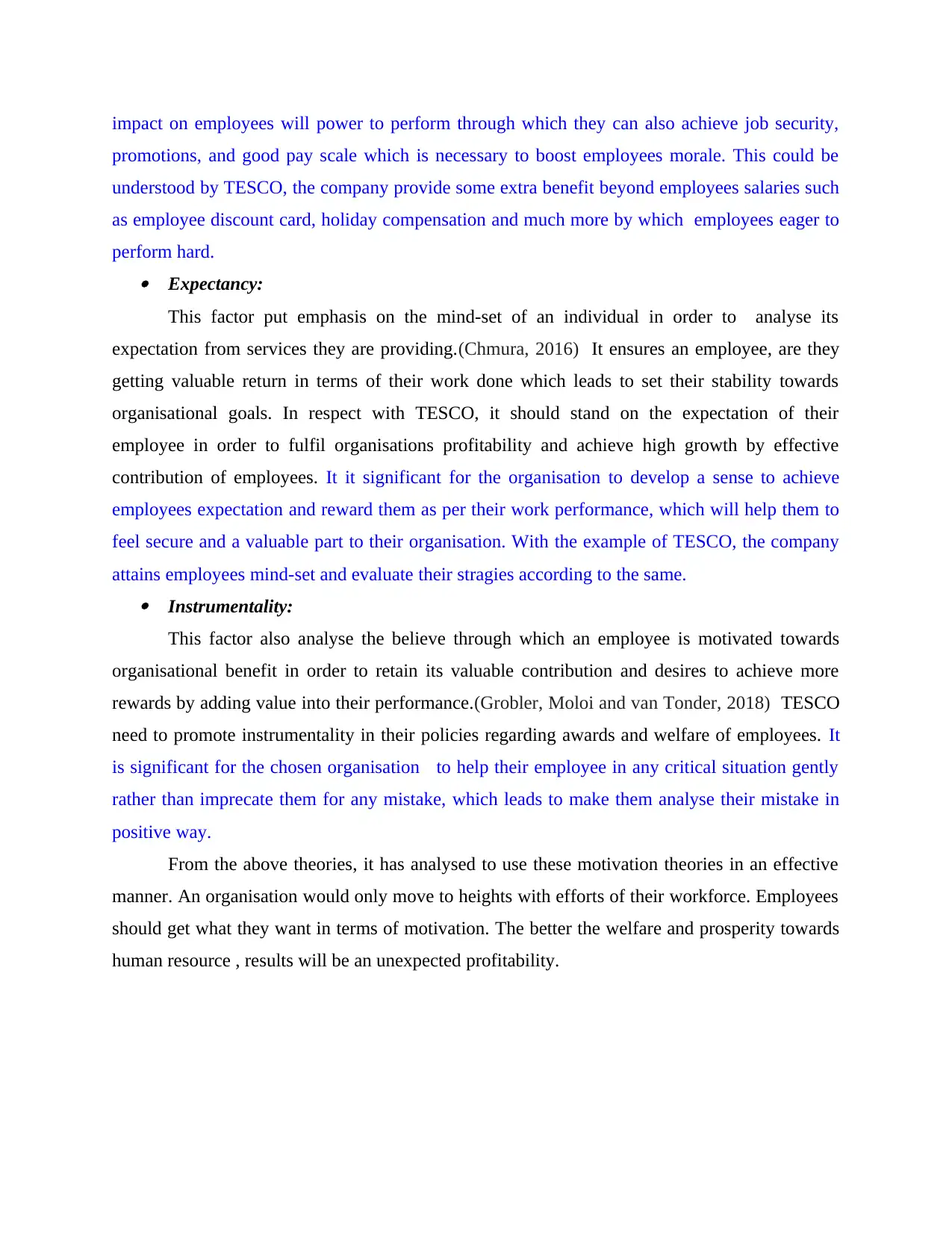
impact on employees will power to perform through which they can also achieve job security,
promotions, and good pay scale which is necessary to boost employees morale. This could be
understood by TESCO, the company provide some extra benefit beyond employees salaries such
as employee discount card, holiday compensation and much more by which employees eager to
perform hard. Expectancy:
This factor put emphasis on the mind-set of an individual in order to analyse its
expectation from services they are providing.(Chmura, 2016) It ensures an employee, are they
getting valuable return in terms of their work done which leads to set their stability towards
organisational goals. In respect with TESCO, it should stand on the expectation of their
employee in order to fulfil organisations profitability and achieve high growth by effective
contribution of employees. It it significant for the organisation to develop a sense to achieve
employees expectation and reward them as per their work performance, which will help them to
feel secure and a valuable part to their organisation. With the example of TESCO, the company
attains employees mind-set and evaluate their stragies according to the same. Instrumentality:
This factor also analyse the believe through which an employee is motivated towards
organisational benefit in order to retain its valuable contribution and desires to achieve more
rewards by adding value into their performance.(Grobler, Moloi and van Tonder, 2018) TESCO
need to promote instrumentality in their policies regarding awards and welfare of employees. It
is significant for the chosen organisation to help their employee in any critical situation gently
rather than imprecate them for any mistake, which leads to make them analyse their mistake in
positive way.
From the above theories, it has analysed to use these motivation theories in an effective
manner. An organisation would only move to heights with efforts of their workforce. Employees
should get what they want in terms of motivation. The better the welfare and prosperity towards
human resource , results will be an unexpected profitability.
promotions, and good pay scale which is necessary to boost employees morale. This could be
understood by TESCO, the company provide some extra benefit beyond employees salaries such
as employee discount card, holiday compensation and much more by which employees eager to
perform hard. Expectancy:
This factor put emphasis on the mind-set of an individual in order to analyse its
expectation from services they are providing.(Chmura, 2016) It ensures an employee, are they
getting valuable return in terms of their work done which leads to set their stability towards
organisational goals. In respect with TESCO, it should stand on the expectation of their
employee in order to fulfil organisations profitability and achieve high growth by effective
contribution of employees. It it significant for the organisation to develop a sense to achieve
employees expectation and reward them as per their work performance, which will help them to
feel secure and a valuable part to their organisation. With the example of TESCO, the company
attains employees mind-set and evaluate their stragies according to the same. Instrumentality:
This factor also analyse the believe through which an employee is motivated towards
organisational benefit in order to retain its valuable contribution and desires to achieve more
rewards by adding value into their performance.(Grobler, Moloi and van Tonder, 2018) TESCO
need to promote instrumentality in their policies regarding awards and welfare of employees. It
is significant for the chosen organisation to help their employee in any critical situation gently
rather than imprecate them for any mistake, which leads to make them analyse their mistake in
positive way.
From the above theories, it has analysed to use these motivation theories in an effective
manner. An organisation would only move to heights with efforts of their workforce. Employees
should get what they want in terms of motivation. The better the welfare and prosperity towards
human resource , results will be an unexpected profitability.
⊘ This is a preview!⊘
Do you want full access?
Subscribe today to unlock all pages.

Trusted by 1+ million students worldwide
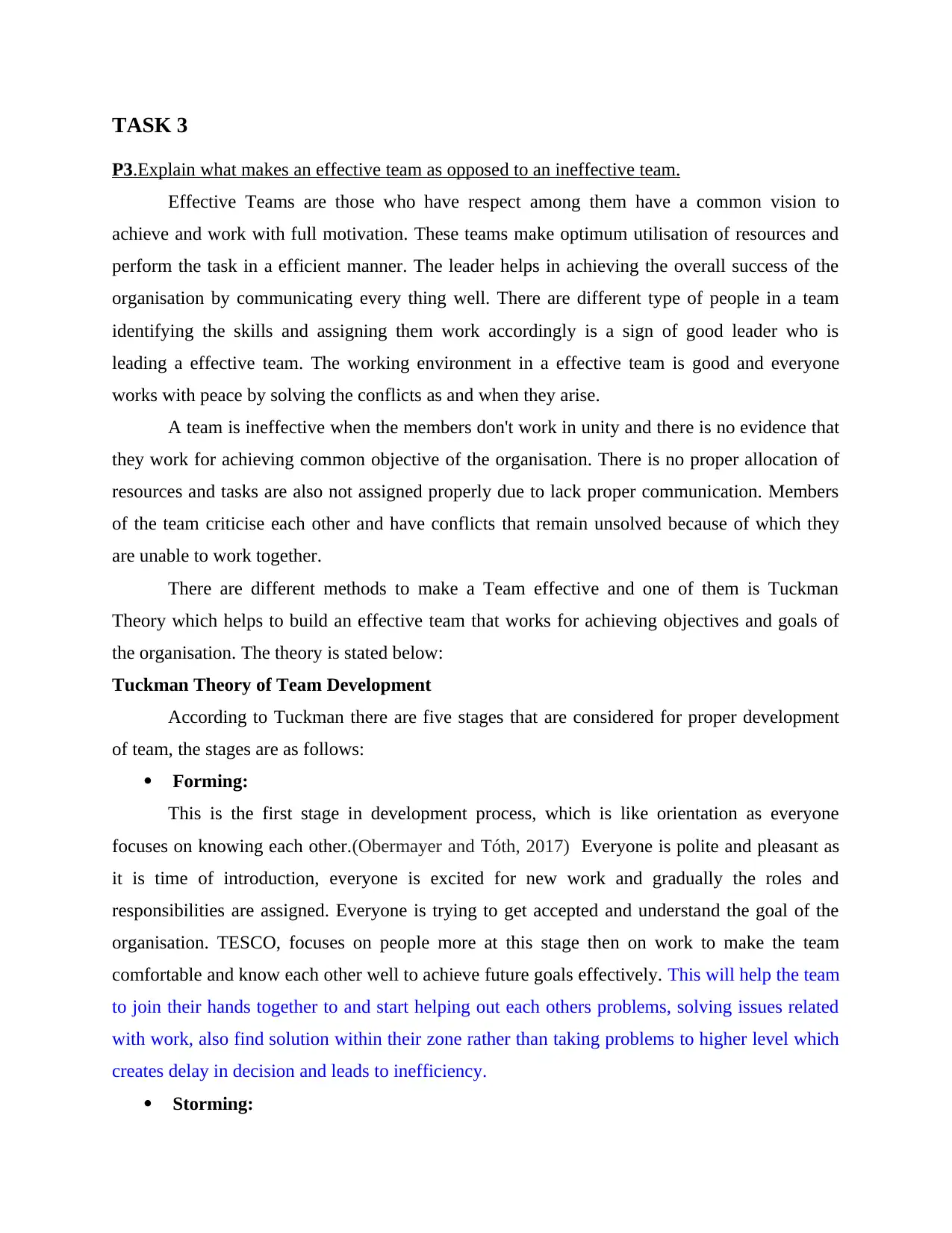
TASK 3
P3.Explain what makes an effective team as opposed to an ineffective team.
Effective Teams are those who have respect among them have a common vision to
achieve and work with full motivation. These teams make optimum utilisation of resources and
perform the task in a efficient manner. The leader helps in achieving the overall success of the
organisation by communicating every thing well. There are different type of people in a team
identifying the skills and assigning them work accordingly is a sign of good leader who is
leading a effective team. The working environment in a effective team is good and everyone
works with peace by solving the conflicts as and when they arise.
A team is ineffective when the members don't work in unity and there is no evidence that
they work for achieving common objective of the organisation. There is no proper allocation of
resources and tasks are also not assigned properly due to lack proper communication. Members
of the team criticise each other and have conflicts that remain unsolved because of which they
are unable to work together.
There are different methods to make a Team effective and one of them is Tuckman
Theory which helps to build an effective team that works for achieving objectives and goals of
the organisation. The theory is stated below:
Tuckman Theory of Team Development
According to Tuckman there are five stages that are considered for proper development
of team, the stages are as follows:
Forming:
This is the first stage in development process, which is like orientation as everyone
focuses on knowing each other.(Obermayer and Tóth, 2017) Everyone is polite and pleasant as
it is time of introduction, everyone is excited for new work and gradually the roles and
responsibilities are assigned. Everyone is trying to get accepted and understand the goal of the
organisation. TESCO, focuses on people more at this stage then on work to make the team
comfortable and know each other well to achieve future goals effectively. This will help the team
to join their hands together to and start helping out each others problems, solving issues related
with work, also find solution within their zone rather than taking problems to higher level which
creates delay in decision and leads to inefficiency.
Storming:
P3.Explain what makes an effective team as opposed to an ineffective team.
Effective Teams are those who have respect among them have a common vision to
achieve and work with full motivation. These teams make optimum utilisation of resources and
perform the task in a efficient manner. The leader helps in achieving the overall success of the
organisation by communicating every thing well. There are different type of people in a team
identifying the skills and assigning them work accordingly is a sign of good leader who is
leading a effective team. The working environment in a effective team is good and everyone
works with peace by solving the conflicts as and when they arise.
A team is ineffective when the members don't work in unity and there is no evidence that
they work for achieving common objective of the organisation. There is no proper allocation of
resources and tasks are also not assigned properly due to lack proper communication. Members
of the team criticise each other and have conflicts that remain unsolved because of which they
are unable to work together.
There are different methods to make a Team effective and one of them is Tuckman
Theory which helps to build an effective team that works for achieving objectives and goals of
the organisation. The theory is stated below:
Tuckman Theory of Team Development
According to Tuckman there are five stages that are considered for proper development
of team, the stages are as follows:
Forming:
This is the first stage in development process, which is like orientation as everyone
focuses on knowing each other.(Obermayer and Tóth, 2017) Everyone is polite and pleasant as
it is time of introduction, everyone is excited for new work and gradually the roles and
responsibilities are assigned. Everyone is trying to get accepted and understand the goal of the
organisation. TESCO, focuses on people more at this stage then on work to make the team
comfortable and know each other well to achieve future goals effectively. This will help the team
to join their hands together to and start helping out each others problems, solving issues related
with work, also find solution within their zone rather than taking problems to higher level which
creates delay in decision and leads to inefficiency.
Storming:
Paraphrase This Document
Need a fresh take? Get an instant paraphrase of this document with our AI Paraphraser
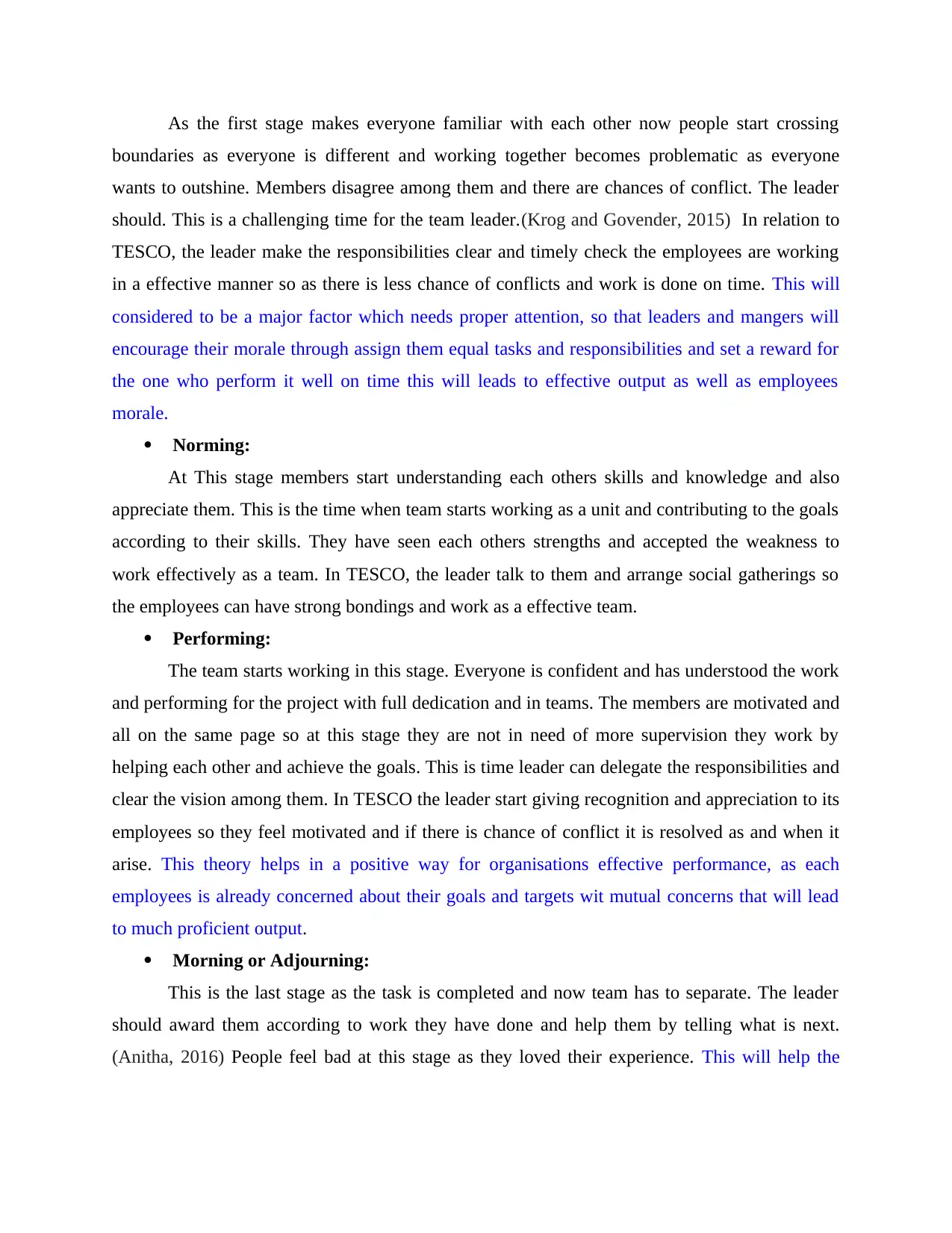
As the first stage makes everyone familiar with each other now people start crossing
boundaries as everyone is different and working together becomes problematic as everyone
wants to outshine. Members disagree among them and there are chances of conflict. The leader
should. This is a challenging time for the team leader.(Krog and Govender, 2015) In relation to
TESCO, the leader make the responsibilities clear and timely check the employees are working
in a effective manner so as there is less chance of conflicts and work is done on time. This will
considered to be a major factor which needs proper attention, so that leaders and mangers will
encourage their morale through assign them equal tasks and responsibilities and set a reward for
the one who perform it well on time this will leads to effective output as well as employees
morale.
Norming:
At This stage members start understanding each others skills and knowledge and also
appreciate them. This is the time when team starts working as a unit and contributing to the goals
according to their skills. They have seen each others strengths and accepted the weakness to
work effectively as a team. In TESCO, the leader talk to them and arrange social gatherings so
the employees can have strong bondings and work as a effective team.
Performing:
The team starts working in this stage. Everyone is confident and has understood the work
and performing for the project with full dedication and in teams. The members are motivated and
all on the same page so at this stage they are not in need of more supervision they work by
helping each other and achieve the goals. This is time leader can delegate the responsibilities and
clear the vision among them. In TESCO the leader start giving recognition and appreciation to its
employees so they feel motivated and if there is chance of conflict it is resolved as and when it
arise. This theory helps in a positive way for organisations effective performance, as each
employees is already concerned about their goals and targets wit mutual concerns that will lead
to much proficient output.
Morning or Adjourning:
This is the last stage as the task is completed and now team has to separate. The leader
should award them according to work they have done and help them by telling what is next.
(Anitha, 2016) People feel bad at this stage as they loved their experience. This will help the
boundaries as everyone is different and working together becomes problematic as everyone
wants to outshine. Members disagree among them and there are chances of conflict. The leader
should. This is a challenging time for the team leader.(Krog and Govender, 2015) In relation to
TESCO, the leader make the responsibilities clear and timely check the employees are working
in a effective manner so as there is less chance of conflicts and work is done on time. This will
considered to be a major factor which needs proper attention, so that leaders and mangers will
encourage their morale through assign them equal tasks and responsibilities and set a reward for
the one who perform it well on time this will leads to effective output as well as employees
morale.
Norming:
At This stage members start understanding each others skills and knowledge and also
appreciate them. This is the time when team starts working as a unit and contributing to the goals
according to their skills. They have seen each others strengths and accepted the weakness to
work effectively as a team. In TESCO, the leader talk to them and arrange social gatherings so
the employees can have strong bondings and work as a effective team.
Performing:
The team starts working in this stage. Everyone is confident and has understood the work
and performing for the project with full dedication and in teams. The members are motivated and
all on the same page so at this stage they are not in need of more supervision they work by
helping each other and achieve the goals. This is time leader can delegate the responsibilities and
clear the vision among them. In TESCO the leader start giving recognition and appreciation to its
employees so they feel motivated and if there is chance of conflict it is resolved as and when it
arise. This theory helps in a positive way for organisations effective performance, as each
employees is already concerned about their goals and targets wit mutual concerns that will lead
to much proficient output.
Morning or Adjourning:
This is the last stage as the task is completed and now team has to separate. The leader
should award them according to work they have done and help them by telling what is next.
(Anitha, 2016) People feel bad at this stage as they loved their experience. This will help the
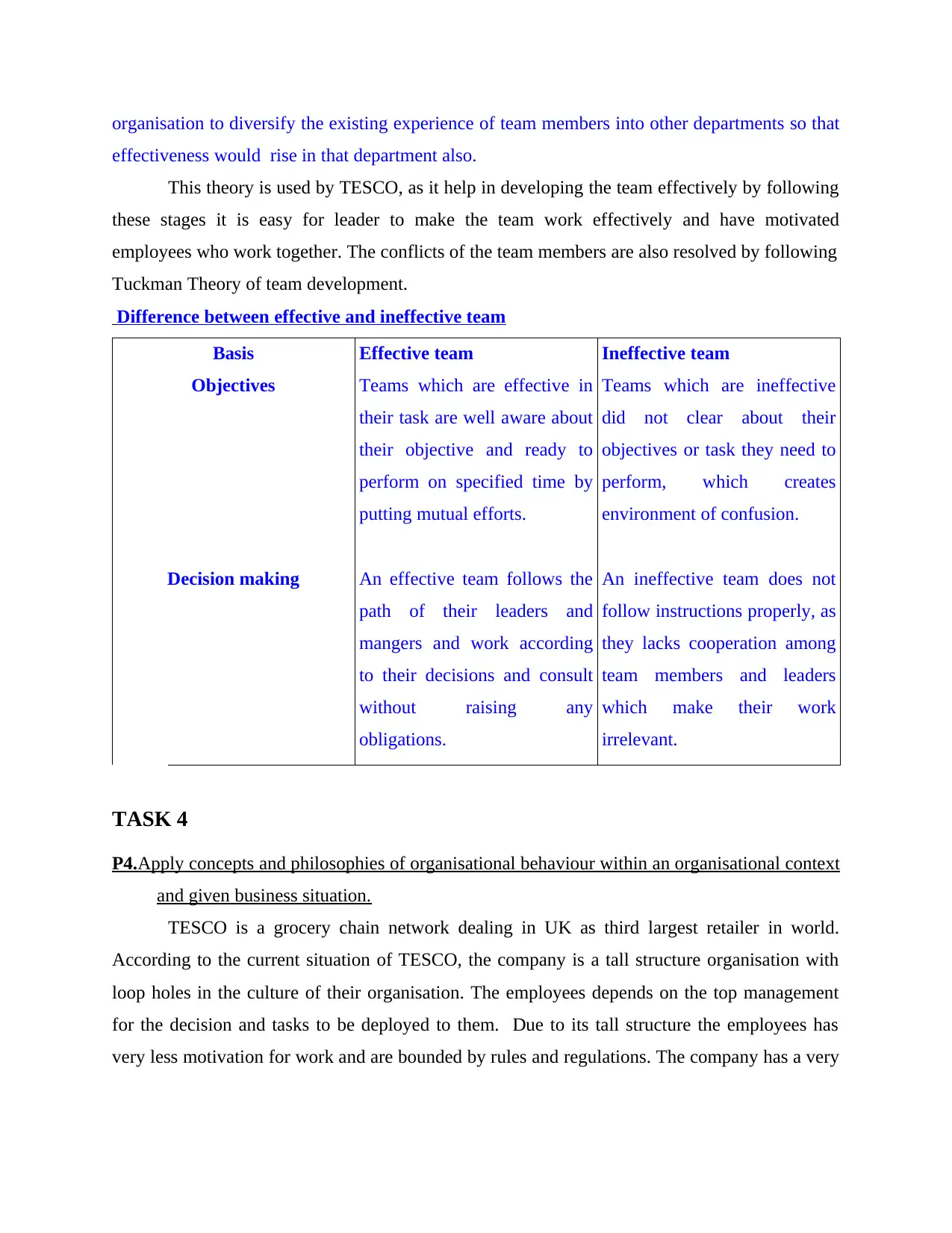
organisation to diversify the existing experience of team members into other departments so that
effectiveness would rise in that department also.
This theory is used by TESCO, as it help in developing the team effectively by following
these stages it is easy for leader to make the team work effectively and have motivated
employees who work together. The conflicts of the team members are also resolved by following
Tuckman Theory of team development.
Difference between effective and ineffective team
Basis
Objectives
Decision making
Effective team
Teams which are effective in
their task are well aware about
their objective and ready to
perform on specified time by
putting mutual efforts.
An effective team follows the
path of their leaders and
mangers and work according
to their decisions and consult
without raising any
obligations.
Ineffective team
Teams which are ineffective
did not clear about their
objectives or task they need to
perform, which creates
environment of confusion.
An ineffective team does not
follow instructions properly, as
they lacks cooperation among
team members and leaders
which make their work
irrelevant.
TASK 4
P4.Apply concepts and philosophies of organisational behaviour within an organisational context
and given business situation.
TESCO is a grocery chain network dealing in UK as third largest retailer in world.
According to the current situation of TESCO, the company is a tall structure organisation with
loop holes in the culture of their organisation. The employees depends on the top management
for the decision and tasks to be deployed to them. Due to its tall structure the employees has
very less motivation for work and are bounded by rules and regulations. The company has a very
effectiveness would rise in that department also.
This theory is used by TESCO, as it help in developing the team effectively by following
these stages it is easy for leader to make the team work effectively and have motivated
employees who work together. The conflicts of the team members are also resolved by following
Tuckman Theory of team development.
Difference between effective and ineffective team
Basis
Objectives
Decision making
Effective team
Teams which are effective in
their task are well aware about
their objective and ready to
perform on specified time by
putting mutual efforts.
An effective team follows the
path of their leaders and
mangers and work according
to their decisions and consult
without raising any
obligations.
Ineffective team
Teams which are ineffective
did not clear about their
objectives or task they need to
perform, which creates
environment of confusion.
An ineffective team does not
follow instructions properly, as
they lacks cooperation among
team members and leaders
which make their work
irrelevant.
TASK 4
P4.Apply concepts and philosophies of organisational behaviour within an organisational context
and given business situation.
TESCO is a grocery chain network dealing in UK as third largest retailer in world.
According to the current situation of TESCO, the company is a tall structure organisation with
loop holes in the culture of their organisation. The employees depends on the top management
for the decision and tasks to be deployed to them. Due to its tall structure the employees has
very less motivation for work and are bounded by rules and regulations. The company has a very
⊘ This is a preview!⊘
Do you want full access?
Subscribe today to unlock all pages.

Trusted by 1+ million students worldwide
1 out of 17
Related Documents
Your All-in-One AI-Powered Toolkit for Academic Success.
+13062052269
info@desklib.com
Available 24*7 on WhatsApp / Email
![[object Object]](/_next/static/media/star-bottom.7253800d.svg)
Unlock your academic potential
Copyright © 2020–2026 A2Z Services. All Rights Reserved. Developed and managed by ZUCOL.




